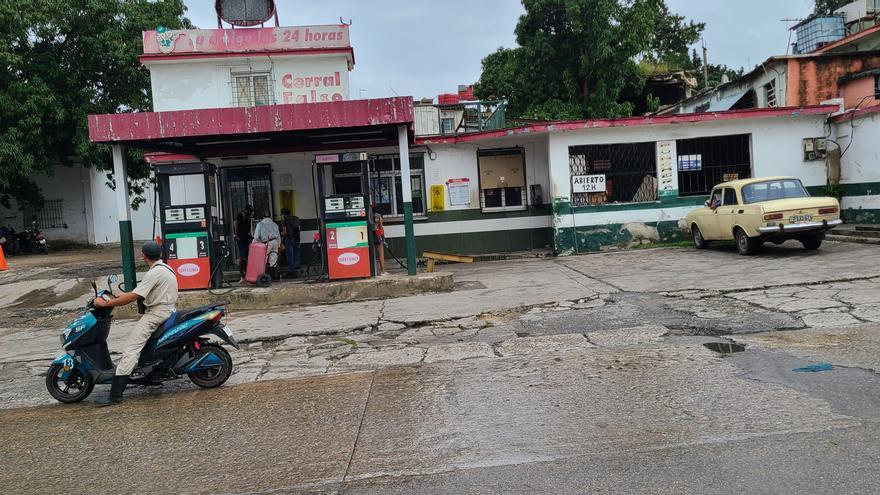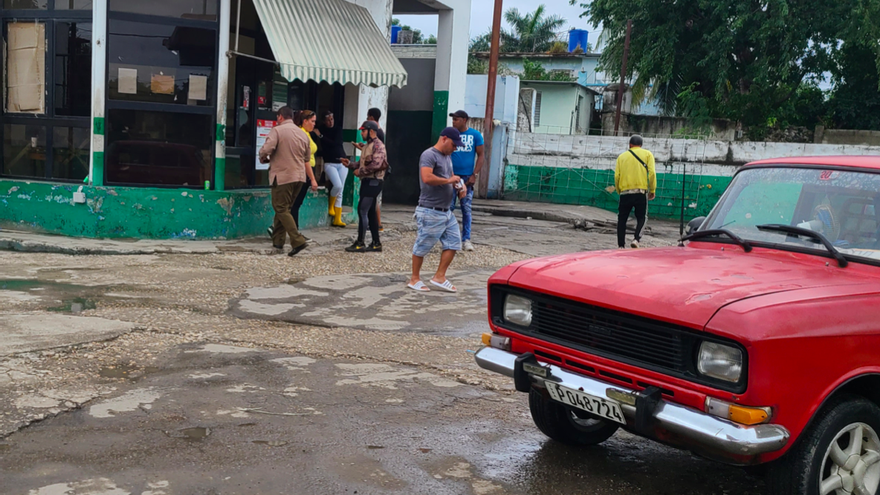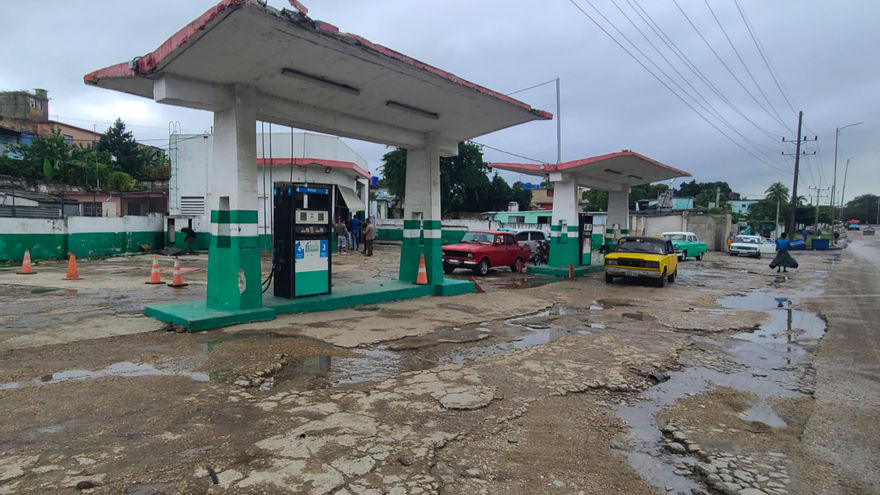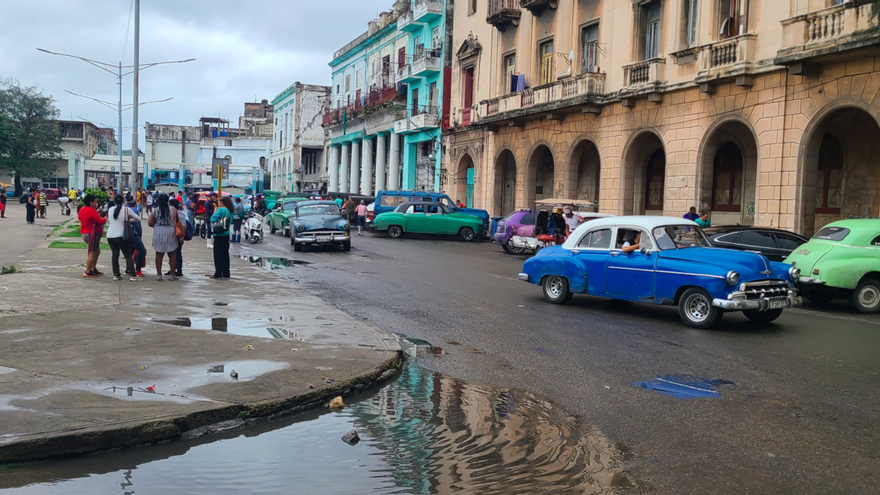
![]() 14ymedio, Havana, 11 January 2024 — While a group of Havana residents observe him, a senior officer of the Armed Forces parks his motorcycle next to a pump at the Los Paraguas Service Center in Guanabacoa. He doesn’t waste time on questions and goes directly to the gas station attendant. After a very brief conversation, and before the displeased looks of those present, the soldier returns to the vehicle, activates the hose and fills the tank.
14ymedio, Havana, 11 January 2024 — While a group of Havana residents observe him, a senior officer of the Armed Forces parks his motorcycle next to a pump at the Los Paraguas Service Center in Guanabacoa. He doesn’t waste time on questions and goes directly to the gas station attendant. After a very brief conversation, and before the displeased looks of those present, the soldier returns to the vehicle, activates the hose and fills the tank.
The anger of those present has an explanation: before buying, each of them had to fight for the “privilege” of being included in a meticulous list of customers that the local government ordered to be drawn up during the fuel crisis of June 2023, and that has been reactivated a few days before the announcement of the increase in fuel prices for next February. The soldier, whose uniform opens doors for him, is above these formalities.
One just has to go to Los Paraguas or the other service center in Guanabacoa, Corral Falso, to sense the drivers’ discomfort. Dozens of sullen faces gather around a woman who gives blunt instructions to those who want to buy: “You have to sign up for the Telegram group.”
The speaker is the person in charge of making the daily list of buyers through the messaging application. On Telegram she identifies herself simply as Esther, although there is a team behind her – also with simple nicknames, such as Yanet or Carilda – which claims to be “directed by the government of Guanabacoa.” Her mantra, which she repeats when a client questions her authority, is: “This is not anarchy, it is queue control, avoiding hoarding, profits, queues, etc.”

The Falso SC C. group had 4,025 members this Thursday; the one at Los Paraguas, 5,046. Every morning, about 20 users join. At approximately six in the morning, Esther tells the group that she is “awaiting information.” As the day progresses, the woman organizes the flow of clients through the client list of each service center, prepared in Excel.
Esther demands name, surname, license number, vehicle license plate and a telephone number. On more than one occasion she has stated that the list “is the same as in 2023” and that the names “were jealously guarded.” “The ones that don’t show up is because they were never there,” she alleges, and she invites the ones she does not know to “stand in line” to make their purchases after those who do show up.
However, this newspaper received a complaint from a reader who detected numerous irregularities in the customer inventory. The Los Paraguas Excel document lists 3,688 clients, of whom 114 are repeated up to four times and 77 do not have badges – a requirement that Ester always demands. In the case of Corral Falso, where 2,855 names are registered, there are 168 that are repeated up to four times and 40 without plates. Some 1,003 clients are on both lists.
No matter how much they accuse her, in groups and – according to her – privately, Esther keeps repeating that she does not have to give explanations. Next to her, a man in shorts and flip-flops acts as a bodyguard. Desperate, due to the lack of gasoline or the slowness of the queue, many customers tend to “get annoying.”
This Wednesday, Esther suspended the queue “until the police arrived and acted against three motorists who were threatening,” she told the group. “They got the wrong idea of the place. This is not a jungle.” Hours later, the woman narrated her outcome: a “person from town” “persuaded” her to resume the queue. “It bothers me that men do not respect a lady,” she summarized, especially when “this activity – the organization of the queue – is directed by women.”

In one of her many explanations since both Telegram groups were reactivated, Esther explained why “the government of Guanabacoa took control of the queue.” “Reason: the paid line standees proliferated with their usual act of making money from human needs and no one reported them,” she argued. But there was more: “For anyone who interrupts this process, there are relevant bodies to make them understan.”
Esther develops a kind of chiefdom over both groups. The stability of the queue, the power to stop the process and her apparent direct connection with the authorities are all in her hands. She often complains that, during the early hours of the morning, those “summoned” don’t dare to go to the gas station. “Do we run or hide?” She then rebuked the clients who, given the growing lack of safety on the streets, don’t leave their house before sunrise.
Other times, she has outbursts of anger, especially when she is accused of corruption or manipulating the queue: “It’s enough for someone to react inappropriately to this comment to remove them from the group,” she threatened, after stating that she was not afraid of accusations or “attacks,” as she calls them.
Gas station employees also refer to the group and Esther’s authority as the only way to buy fuel. “You have to sign up between eight and nine, when they open the group. Meanwhile, you can’t write,” a worker at Los Paraguas service center tells 14ymedio .
As for the new prices, the employee is not happy either. “Hopefully, there will be a debate and that will change. We agree that they increase for tourists, but for self-employed persons, when you raise the cost of gasoline, the result is that they will increase their prices. If they charged 100 pesos for something before, now they will charge 500. To me, they are finished,” period.
“Hopefully, there will be a debate and that will change. We agree that they should go up for tourists, but for self-employed persons, when you increase the cost of gasoline, the result is that they will increase their prices”
The truth is that, from the seat of Government, the outlook is not rosy either. The expert from the University of Texas (USA), Jorge Piñón, explained to this newspaper that one of the causes of the current national gasoline crisis is that Cuban refineries – particularly the one in Havana – have been out of service.
The researcher, who analyzes the behavior of gasoline, diesel and liquefied petroleum gas consumption in the country, has noted that in the last five years with official figures (2017-2021) there has been an increase of 40% in demand for gasoline in Cuba. In 2022, adds Piñón, providing his own data, the country consumed 335,000 tons, an incredible amount, if one considers that only 240,000 tons were consumed in all of the previous year. However, in 2023 there was a drop of 23% from the year before: 258,000 tons.
On the other hand, the movement of tankers through Cuban ports does not stop. The ships Ocean Mariner, Vilma and Delsa are anchored in terminals in Mexico and about to set sail for Havana. María Cristina, Alicia, Lourdes, Petion and Esperanza are waiting in Venezuela.
“What is the true cost (cash flow) of these volumes? We know that shipments from Venezuela are in exchange (barter) for products and services provided by Cuba, but there has to be an accounting statement that shows the economic impact (cash flow) in the State budget,” argues Piñón. “Same as supplies from Mexico: what is the cost of these barrels?”
“Loose tongues” is the state that best defines Cubans’ discomfort. In the huge lines of vehicles waiting their turn at the Cupet, in the masses that gather at taxi stands, in taxis, increasingly hard to pay, people emphasize: “We have to rob these people. Fuel, oil, petroleum, whatever.”
For Ernesto, age 58, the dilemma already has an answer. “I’m going to sell the car,” he tells this newspaper. Owner of an old Cadillac that he has used for years to transport passengers, this Havana native who worked for decades at an official radio station had the vehicle in the workshop months ago for bodywork. “I’m not even going to take it out of there, I already told the owner of the place that it is for sale.”

“I did a quick calculation after the Round Table [program on State TV] and it showed me that if I don’t charge the entire trip at more than 300 pesos to each passenger, I can’t pay for the fuel and keep the car running. And if I charge that, I’m going to spend every day in the street wrapped up and hearing insults, so I better stay at home,” he summarizes.
Yogurt, cheese and pork make up the offering that Iván, a resident of Alquízar, province of Artemisa, frequently takes to sell in Havana. Although he sometimes makes the trip on the train that connects the Cuban capital with San Antonio de los Baños, he also alternates trips with his son-in-law, who drives a Lada. Now, after finding out about the rise in prices, he has been “doing the math” for hours.
Between raising the price of his merchandise or suspending his merchant route, Iván, for the moment, prefers “not to promise anything” to clients, until he can verify, in practice, how much he must invest to get his merchandise to the Cuban capital. “There is always a chance that these people will back down because this is going to be a very unpopular measure,” is his hope.
____________
COLLABORATE WITH OUR WORK: The 14ymedio team is committed to practicing serious journalism that reflects Cuba’s reality in all its depth. Thank you for joining us on this long journey. We invite you to continue supporting us by becoming a member of 14ymedio now. Together we can continue transforming journalism in Cuba.
